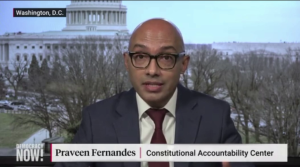February 2024 Newsletter: A Relentless Attack on our Government’s Ability to Function

Last month, the Supreme Court heard oral arguments in Loper Bright v. Raimondo and Relentless, Inc. v. Department of Commerce, consolidated cases brought by the fishing industry, alongside other corporate interest groups, that threaten to undermine federal agencies’ ability to use their expertise to act in the public interest. In these cases, the Court is considering whether to overrule Chevron deference, a doctrine requiring courts to defer to an agency’s reasonable interpretation of an ambiguous law the agency is charged with administering. Chevron is one of the most cited administrative law cases in history, and for good reason: it ensures that when Congress passes laws and leaves room for expert agencies to help give meaning to those laws, courts will respect those expert judgments. The alternative would be to allow judges to substitute their own policy judgments for those of the experts at federal agencies. Overturning Chevron would represent a huge shift of power from the executive branch to unelected judges, and would likely be a deregulatory boon for the corporate interests that brought this case.
Indeed, this attack on Chevron is only one front in a multifaceted conservative attack on the administrative state. CAC Appellate Counsel Miriam Becker-Cohen made this point in a letter to the editor that was published in the Washington Post. As Miriam wrote, “Let’s recognize the battle cry to overrule Chevron for what it is: a move in the conservative project to hamstring government by making it more difficult for agencies to implement the laws that Congress has passed, not a thoughtful reconsideration of a precedent on the basis of binding law.”
Conservatives are pressing these attacks harder than ever, and no wonder. As CAC Deputy Chief Counsel Brian Frazelle explained to Bloomberg Law, “any fair examination of the substance of what the court has done over the past decade” shows that “there’s no doubt this is an aggressively pro-business court.” CAC’s research demonstrates that the Supreme Court’s conservative supermajority is more skewed in favor of corporate interests than ever, siding with the Chamber of Commerce 72% of the time. As Brian told Bloomberg Law, “The very fact that the court is considering whether to reverse a well-established precedent going back 40 years” in Loper Bright and Relentless “is emblematic of the pro-corporate tilt that this court has.”
After all, the legal arguments in support of Chevron deference are incredibly strong. CAC filed an amicus brief in Loper Bright on behalf of an ideologically diverse group of scholars of administrative law and the Administrative Procedure Act (APA). Our brief explains that that the challengers to Chevron got their text and history analysis wrong when they argued that Chevron deference was precluded by the APA. In fact, nothing in the APA’s text precludes agency deference, and the historical record shows that the APA was not meant to disturb the long tradition of agency deference.
For decades, corporate interests have sought to dismantle regulations and tie the hands of agency experts in spite of constitutional text and history. CAC is proud to be fighting back.

- Chiaverini v. City of Napoleon, Ohio — The Supreme Court is considering whether a plaintiff can bring a malicious prosecution case if some, but not all, of the charges against the plaintiff lack probable cause. Supreme Court, filed February 7.
- Trump v. Anderson — The Supreme Court is considering whether Donald Trump should be prohibited from appearing as a candidate on the Colorado ballot due to his disqualification from office under Section Three of the Fourteenth Amendment. CAC’s amicus brief explains why Section Three applies to both presidents and the presidency. Supreme Court, filed January 31.
- Texas v. Biden — The United States Court of Appeals for the Fifth Circuit is considering a challenge to an executive order raising the minimum wage for federal contractors. CAC’s brief in support of the Department of Labor argues that this is far from the type of “extraordinary” case in which the “major questions” doctrine might apply. We also show that applying the “major questions” doctrine too broadly would undermine traditional statutory interpretation and constitutional principles. Fifth Circuit, filed January 29.
- Maryland Shall Issue, Inc. v. Anne Arundel County — CAC WIN — The United States Court of Appeals for the Fourth Circuit held that requiring firearms dealers to provide safety literature to their consumers is constitutional under the First Amendment. The Court echoed CAC’s argument that the Zauderer v. Office of Disciplinary Counsel standard applies to Anne Arundel County’s safety literature because it is “factual and uncontroversial” speech. Fourth Circuit, decision rendered January 23.
- Merck v. Walmart — The United States Court of Appeals for the Sixth Circuit is considering whether employees and job applicants deprived of their right to notice and an opportunity to be heard before being subjected to an adverse action on the basis of a consumer report have standing to assert their claims under the Fair Credit Reporting Act in federal court. CAC’s brief in support of Thomas Merck explains that Merck suffered a concrete injury within the meaning of Article III’s requirements. Thus, Merck has standing to pursue his case in federal court. Sixth Circuit, filed January 23.
- Villarreal v. City of Laredo — The United States Court of Appeals for the Fifth Circuit considered whether government officials are entitled to qualified immunity in a suit alleging that they violated a journalist’s constitutional rights by arresting and prosecuting her simply for asking a police officer a question. In its 9-7 en banc opinion, the Fifth Circuit Court held that Villarreal’s arrest was not “obviously unconstitutional” and thus that the Laredo officials are shielded from suit by qualified immunity. Judge Ho’s dissent commended the ideologically diverse coalition of amici, including CAC, for filing briefs in defense of free speech. Fifth Circuit, decision rendered January 23.


- January 24: CAC Vice President Praveen Fernandes appeared on Democracy Now! for a debate about whether former President Trump should be barred from the presidential ballot due to his ineligibility for office under Section Three of the Fourteenth Amendment. “CAC’s Fernandes Joins Democracy Now! for a Debate on President Trump’s Ineligibility for Office.”
- February 8: CAC Appellate Counsel Smita Ghosh published an op-ed in Newsweek in which she argues that presidential immunity from criminal prosecution is at odds with the text and history of the Constitution. “The Founding Fathers Didn’t Think Donald Trump Should Get Immunity Either.”
- February 6: CAC Appellate Counsel Smita Ghosh published an op-ed in Slate in which she argues that the text and history of the Constitution support applying the phrase “officers of the United States” in Section Three of the Fourteenth Amendment to presidents. “There’s a Huge Originalist Hole in Trump’s Argument for Staying on the Ballot.”
- February 5: CAC Chief Counsel Brianne Gorod was quoted in an article in Reuters discussing the significance of the Section Three of the Fourteenth Amendment case Trump v. Anderson that is headed to the Supreme Court. “Trump heads to US Supreme Court with a familiar claim: He is untouchable.”
- February 1: CAC’s brief in the Supreme Court case Trump v. Anderson was cited in an article in CNN. “Trump’s critics hope that Antonin Scalia can sway the Supreme Court in 14th Amendment fight.”
- January 31: CAC Vice President Praveen Fernandes was quoted in an article in Law&Crime discussing the meaning and history behind Section Three of the Fourteenth Amendment. “Even Jefferson Davis recognized Section III ‘automatically disqualified him’: Dozens of historians urge Supreme Court to remove Trump from 2024 ballot.”
- January 31: CAC Appellate Counsel Miriam Becker-Cohen was quoted in an article in Context discussing the growing movement among states to remove the slavery exception for prisoners from their constitutions. “Ending US jail workers’ slavery clause ‘could net billions’.”
- January 27: CAC Vice President Praveen Fernandes was quoted in i News discussing why the Supreme Court should uphold the Colorado Supreme Court decision that held that Trump should not be on the ballot. “The lawyers trying to force Trump off the ballot, and why they think they will win.”
- January 17: CAC Appellate Counsel Miriam Becker-Cohen’s response to an op-ed arguing that the Supreme Court should overturn the Chevron doctrine was published in the Washington Post. “Opinion | Why the Chevron deference is needed.”
- January 16: CAC Deputy Chief Counsel Brian Frazelle was quoted in an article in Bloomberg Law discussing the pro-business nature of the current Supreme Court and two cases that are challenging the 40-year-old Chevron doctrine. “Pro-Business Supreme Court to Be Tested in Regulatory Showdown.”

CAC Think Tank Scholarship Making an Impact
CAC Civil Rights Director David Gans’s work was quoted twice in Justice Wecht’s concurring opinion in a January 29th Pennsylvania Supreme Court decision allowing a challenge to state law that had disallowed Medicaid funding of abortion. The opinion cited Gans’s Atlantic piece, No, Really, the Right to an Abortion Is Supported by the Text and History of the Constitution. That essay distilled the rich scholarship that is explored in his longer law review article, Reproductive Originalism.

Welcome, Professor Alexis Hoag-Fordjour!

CAC is pleased to announce that it has selected Professor Alexis Hoag-Fordjour of Brooklyn Law School as its inaugural Scholar-in-Residence. Beginning on July 1, 2024, Hoag-Fordjour will work independently for one year on scholarship surfacing the historical context of Reconstruction to provide a clarifying framework for interpreting rights in the present. She will also participate in the life of CAC’s ongoing work in litigation, communications, and collaboration with progressive movement partners. CAC is thrilled to work collaboratively with Professor Hoag-Fordjour!

